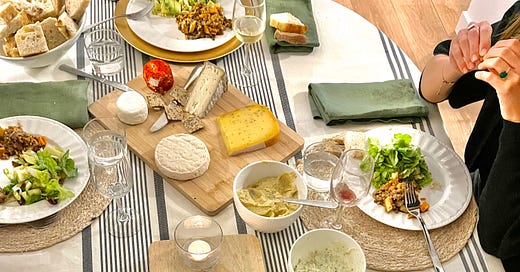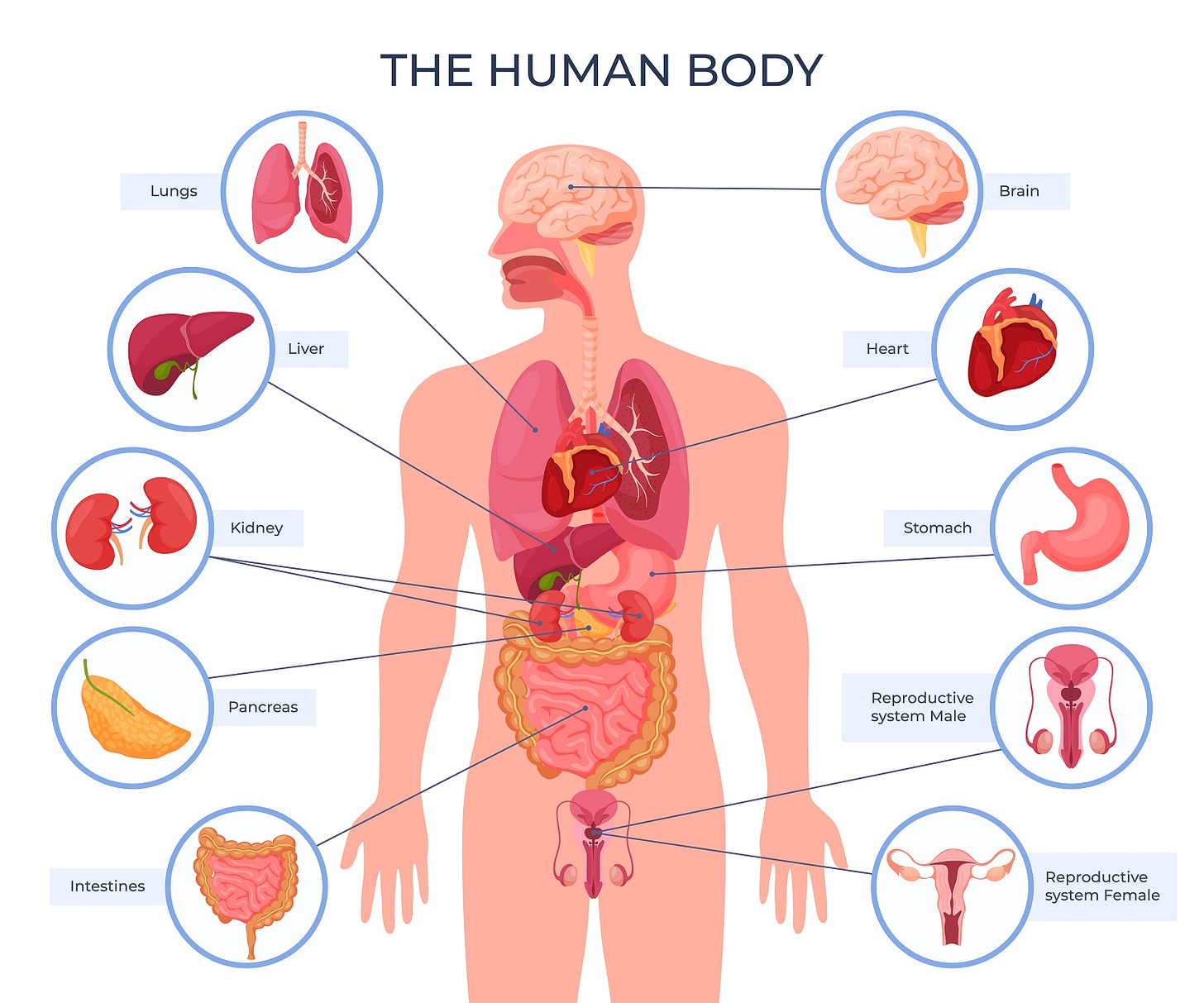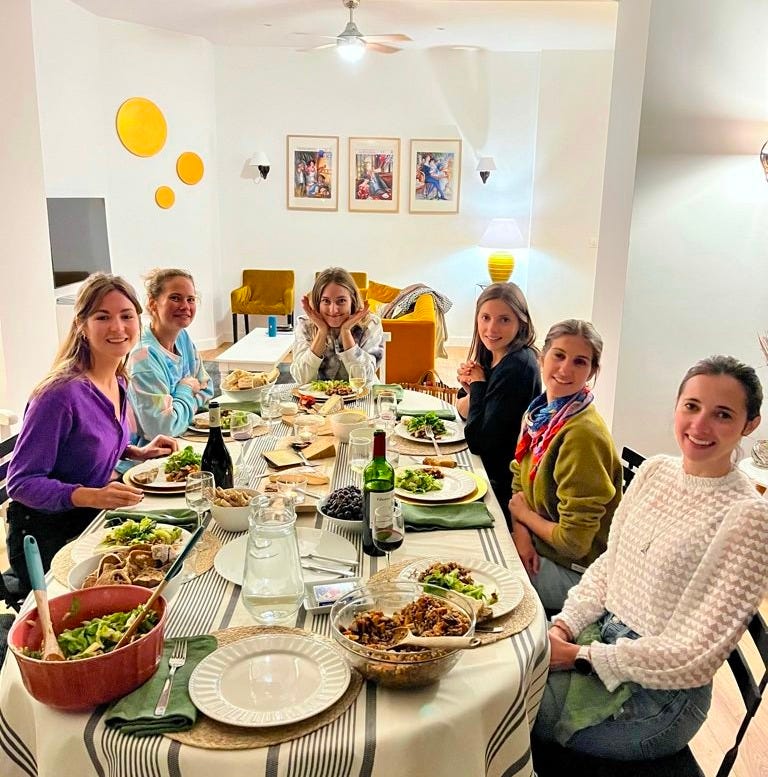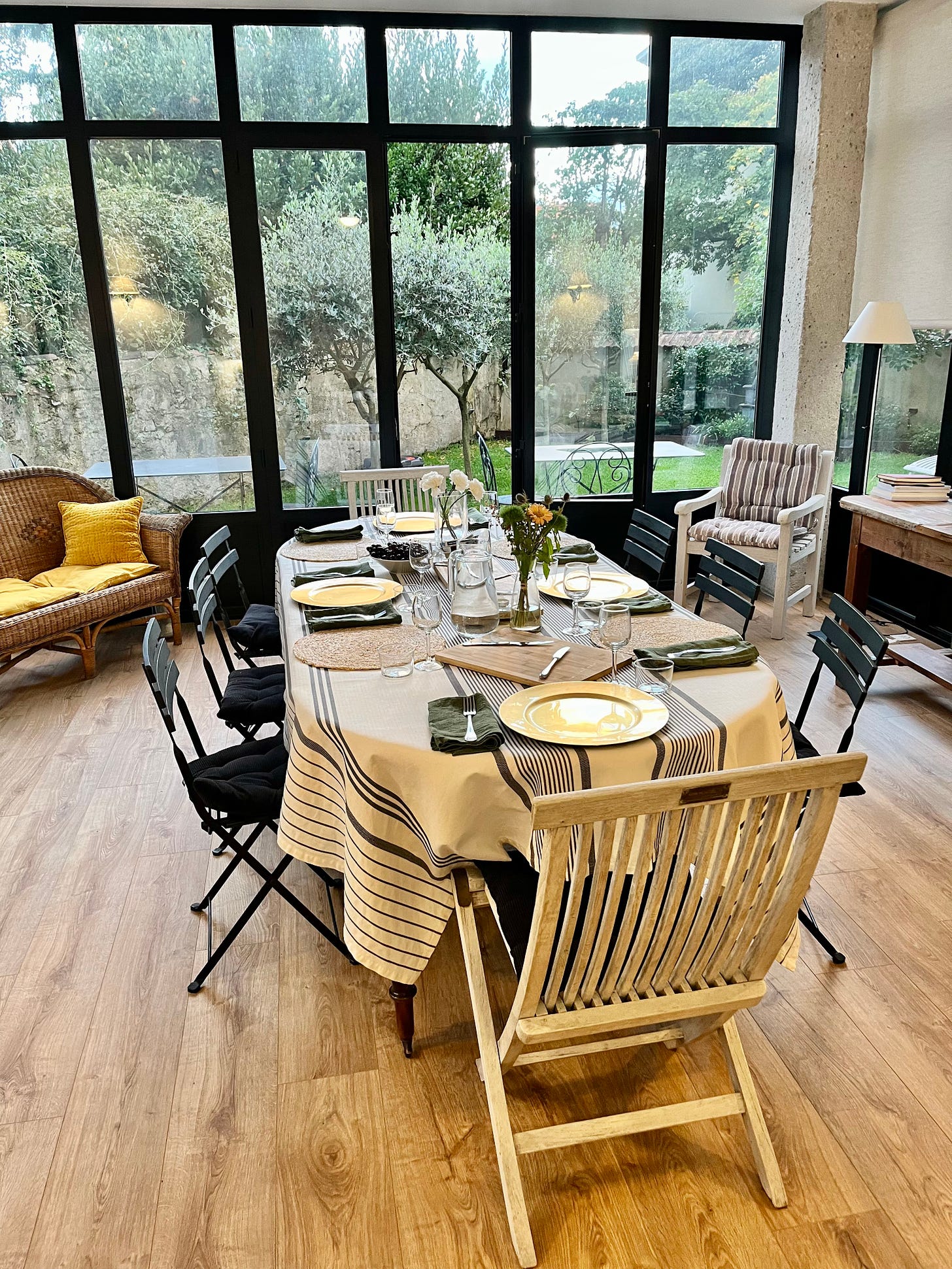Approved & supported by these incredible, celebrated & brilliant women: Dr. Rosa Keller PhD RD Nutrition Science, Dr. Ricki Pollycove Holistic OBGYN, Dr. Mandy Carrol Murphy MPH RD, and Dr. Claire Packer, OBGYN Resident
Open this in Substack to comment, like and message me. 🙂
*This newsletter is not intended to be medical advice.
Before we begin — you may have noticed that this week’s newsletter is coming out on a Sunday, not the normal Saturday. We landed on American soil yesterday after 10 months in France and I’m currently on a big road trip to see family and friends, so the send button get delayed by a day. So sorry if you were looking forward to this yesterday! I’ll be taking a couple weeks off now to enjoy quality time with my loved ones and will be back with these newsletters beginning of November (or earlier, if I find that I can swing it). But I’d rather bring quality to you than send something your way that might not actually be helpful to you.
If you look forward to these newsletters and/or find them helpful, please please let me know! Reply to this email, comment, text me, call me, Instagram message me (@hello_julienne). This will help me continue to bring this to life!
And now, to this week’s fascinating topic.
Jump to Recipe: Fromage & Filles Soirée!
This week, during my physical therapy session, I found myself staring at an anatomy chart.
And, like all the others I’ve seen before, this one depicted the “human body” with a man’s anatomy—yes, complete with a penis. This immediately sent conflicting, unclear thoughts through my mind.
How can we expect to understand our health and bodies when what we see is not a true reflection of ourselves? The reality is that medical science is just beginning to study women in a way that considers our unique biology, and, even more so, the biology of women during pregnancy.
In addition, we’re still seeing a majority of men in leadership positions in our communities and workplaces. We often turn to men to make the big decisions, guide us, and help us build toward our goals. But men’s brains, bodies, and hormones work differently—so they achieve success in ways that might not align with how we get there.
When we model ourselves after them, we blur our own path. This makes it harder to see our unique potential and to reach our own versions of success.
But here’s the good news—I have so much hope! I’m incredibly optimistic about what’s ahead for women in science and society.
What’s truly exciting is the wave of studies and movements focusing on women, especially in nutrition and gut health. These studies are fascinating. And they are reshaping what we know about how our bodies and brains work throughout our lives and during pregnancy—and how that affects our babies, too.
So here’s part two (following last week’s post) of the significant research and momentum toward better understanding the woman’s body—how we can use this knowledge to gain clarity and achieve more.
Let’s talk about something revolutionary—the gut-brain connection.
Historically, women’s health has been understudied, with only 2% of research funding in the UK going toward women’s health issues like pregnancy and childbirth. In the U.S., this number is around 10.8% at the National Institutes of Health (NIH), but we still have a long way to go. (source1, source2) Thankfully, momentum is growing, and research into women’s gut health, brain function, and hormonal influences is leading the charge.
There’s been significant progress in understanding how the gut-brain axis functions specifically for women.
The gut microbiome is home to over 100 trillion bacteria that are vital for everything from digestion to hormone regulation. (source)
Estrogen, a hormone, is a key player in women’s brain health and is intricately tied to gut health. For instance, women experience fluctuations in estrogen during their menstrual cycles, which can influence everything from mood swings to memory retention. This same hormone also plays a role in our gut health by influencing gut bacteria, and in return, our gut health impacts how effectively estrogen functions in the brain. (source)
One area of research that’s particularly promising is how improving gut health—through diet, especially with fiber and fermented foods—can have a profound effect on brain function and mood. A healthy gut supports better hormone balance, which in turn enhances mental clarity and emotional stability. This is especially true during hormonal changes like menstruation, pregnancy, and menopause.
Research has shown that improving gut health can ease symptoms associated with hormonal imbalances like anxiety and depression. One fascinating finding is that women who consume more phytoestrogen-rich foods (found in soy, flaxseeds, and whole grains) may have better cognitive function and less brain fog, especially during menopausal transitions. (source)
The importance of what we eat has never been clearer.
Studies are now emphasizing that the health of our gut microbiome influences not only digestion but also our mood and cognitive performance. For example, fermented foods like yogurt, cheese (thank goodness!), kimchi, and kombucha, along with fiber-rich vegetables, have been shown to directly improve gut flora, which plays a vital role in producing hormones like serotonin and dopamine. These hormones are responsible for regulating mood, focus, and emotional well-being. (source)
Not only that, but research from Stanford like the MOMS study and other leading institutions is now looking into how microbiota-targeted dietary interventions—like a high-fiber or fermented food diet—can improve health outcomes for both mothers and infants during pregnancy and postpartum.
Why This Matters for You
This is a moment to celebrate how much power we have over our own health and clarity. By understanding and nurturing the gut-brain connection, we can achieve the clarity we need to make better decisions, live happier lives, and improve our well-being. It’s exciting to think that, by taking small steps to enhance gut health, you’re not only caring for your body but also optimizing your mind and emotional resilience.
We’re entering a new era for women’s health—one where we prioritize our unique biology and learn how to unlock our full potential. Let’s keep the momentum going, gals!
—-
If you’re interested in hearing more about The Women’s Wellness Corner, or want to bring these powerful women’s insights from experts into your workplace, take a look here and send me a note to anja@hellojulienne.com or reply to this email.
We’re building networks and safe spaces for women in the workplace, and we’d love to have you join us.
If you want to improve your own diet for pregnancy, or to avoid/manage gestational diabetes, check out our simple Guides & Programs with meal plans, recipes & more!
FROMAGE & FILLES (“Froh-mahj & Fee” - French for Cheese & Gals)
A Special Evening For Optimal Gut / Brain Health
This week’s recipe is a little different. Due to my goal here of connecting your gut health with your mood and cognitive function, I’ve outlined a Fromage & Filles (cheese & gals) night for you to host. The goal is for everyone to eat enriching, fermented, protein and fiber-rich foods while enjoying an evening with your friends. And even better – invite at least 1-2 gals who you don’t know well, to include a new spirit and smile in your already tight group.
Rules of the Game / Ingredients:
Everyone brings 1 cheese that they love, and they have to be ready to tell a story about it. (I’d like to say Velveta cheese doesn’t count, but if you have a good story, there’s room for it.)
Everyone is welcome to bring 1 other item: A beverage of choice, hummus & vegetables, pickles, crackers, fruits, dark chocolate…whatever comes to mind that will be a tasty pairing.
As the host, you:
Make a big salad
Provide a bunch of high-quality fermented bread, like sourdough
Put out a bowl of freshly washed grapes
Don’t forget something for dessert (can be as simple as strawberries and a few bars of dark chocolate).
Perhaps have a couple bottles of wine, or a specialty cocktail and sparkling water, on hand too.
Bonus: Have tea, mugs and a plan to boil hot water ready to rock, so that you can offer tea during dessert hour to end the night strong. This will settle the tummies and help everyone sleep happy.
Instructions:
Set up the dining table: Put 2-3 large cutting boards or platters in the middle of your dining table.
Add 2-3 knives to each board/platter (cheese knives, plus some sharper knives for the hard cheeses). Put out the bowl of grapes and freshly sliced bread.
Put water glasses and a big jug of water on the table.
Have the salad made with dressing on the side, ready to toss and serve when it’s time to eat. Wash the strawberries and chop the bars of chocolate to have ready for after dinner.
Set-up a cocktail table with wine glasses and beverages.
The event:
Everyone comes over and chooses where to place their cheese and goodies on the boards/platters as they arrive. Placement is part of their form of expression!
Pour their drink of choice and enjoy some cocktail-hour time saying hello and catching up while everyone arrives.
Sit down when everyone has arrived and is hungry.
Start with a toast, asking them to share their story as to why they chose this cheese, and let them go around the circle storytelling and giggling. Encourage them not to be polite or shy - reach over each other to grab cheese & snacks to their hearts’ content.
Then let the feasting and enjoying begin!
When everyone seems satisfied, bring over the dessert nibbles. Boil tea and offer tea to everyone.
Let them help with dishes – this will give you more oomph to do it again sometime, since they will all beg for a round 2.
Enjoy!! And please let me know if you whipped this up by commenting below or sending me a message. I love photos too! If you post on Instagram or TikTok, please tag @hello_julienne so I can see and repost. 😀
Printable Instructions (b/w) — download and print here:
DISCLAIMER: THIS WEBSITE DOES NOT PROVIDE MEDICAL ADVICE
The information, including but not limited to, recipes, menus, newsletters, tips, text, graphics, images and other material contained on this website, resources and newsletters are for informational purposes only. No material on this site is intended to be a substitute for professional medical advice, diagnosis or treatment. Always seek the advice of your physician or other qualified health care provider with any questions you may have regarding a medical condition or treatment and before undertaking a new health care or nutritional regimen, and never disregard professional medical advice or delay in seeking it because of something you have read on this website.














